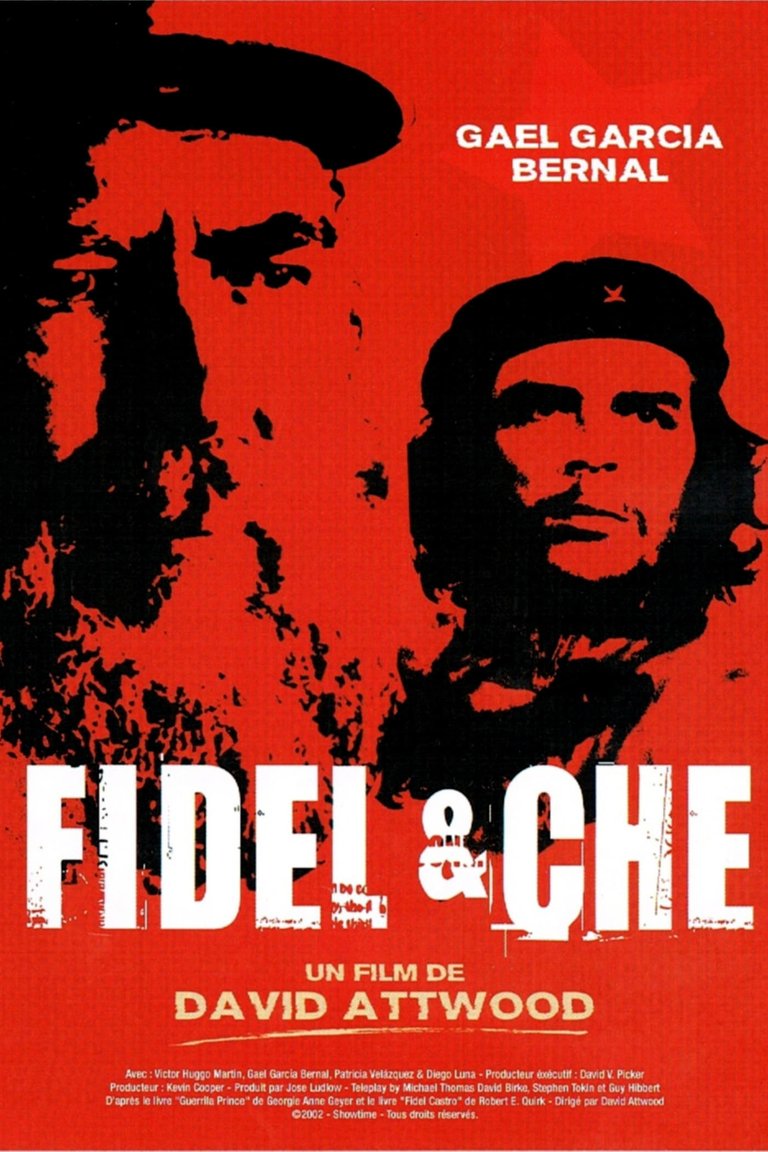Television Review: Fidel (2002)

Two decades ago world looked more peaceful and orderly than it is today. And all those who challenged the order, built on the unquestionable global hegemony of United States, were seen either as minor temporary nuissance or generally harmless relics of the past. One among the latter was the protagonist of Fidel, 2002 biographical television miniseries directed by David Attwood.
Script by Stephen Tolkin is based on two books - Guerilla Prince by Georgie Anne Geyer and Fidel Castro by Robert E. Quirk. The series begins with a prologue set in contemporary Cuba where taxi driver entertains Western tourists with jokes about longevity of its Communist leader Fidel Castro (played by Honorato Magaloni) who had ruled the island with an iron fist for more than four decades. Old Castro begins to reminisce about his early days and flashbacks puts plot fifty years earlier when young attorney Fidel Castro (played by Victor Huggo Martin), despite his privileged background, feels deep displeasure with the state of affairs of Cuba, which, while being nominally independent, is in the pocket of US corporations and organised crime that support regime of corrupt and tyrannical president Fulgencio Batista (played by Tony Plana). After unsuccessful attempts to change government through conventional means, Castro concludes that the only solution is armed uprising. It begins with attack on Moncada Barracks on July 26th 1952, which turns into bloody fiasco with most of Castro supporters killed, captured, tortured and executed. Batista is convinced that is Castro so utterly defeated that he doesn’t represent threat so releases him from prison, after which Castro will go to exile in Mexico. From there he launches another attempt of revolution in late 1956, arriving on the island on the yacht Granma with group of revolutionaries that include young Argentine physician Ernesto “Che” Guevara (played by Gael Garcia Bernal). At first, it looks like another disaster, with most of his followers killed and captured, but Castro and Che manage to arrive in the mountainous interior, where they gain support among local peasants. Numbers of Castro’s followers grow, partly because of skilful guerilla tactics, partly because of Castro’s ability to manipulate international public via American journalist Herbert Matthews (played by Ken Jenkins), and his guerilla army becomes force around which different anti-Batista factions unite. By early 1959 Batista is forced to flee and Castro’s rebel army triumphantly enters Havana. Once in power, Castro starts ambitious program of reform, but Cuban economy begins to suffer, US government gets increasingly hostile and many of Castro’s close friends and comrades turn against him, seeing his methods of rule not different or even worse than Batista’s. Castro begins to put his former supporters in prison, while at the same time, decides to allign Cuba with Soviet Union and adopts Marxism-Leninism as country’s official ideology.
During the Cold War Fidel Castro was by majority of US public considered one of its greatest villains. A decade after the collapse of East Bloc, Communist island nation, exhausted by loss of its Soviet sponsor and crippling economic sanctions, wasn’t considered to be the threat and Castro’s and his revolutionary rise to power didn’t look very inspirational. This allowed Showtime Networks to produce miniseries that tried to depict Cuban leader with more objectivity and nuance. Such approach in Tolkin’s script has even created displeasure and protests from the ranks of traditionallly anti-Castro community of Cuban exiles in USA. The miniseries, made with decent budget, takes conventional route of depicting most important events in Castro’s early life, with his revolutionary struggle being given primacy over his colourful personal life. Producers managed to gather very capable cast, made mainly from Latin American actors, among which Mexican star Gael Garcia Bernal makes the biggest impression as Che Guevara, which later led him to be cast as the same character in 2004 biopic The Motorcycle Diaries. The script gives comprehensive depiction of major events before and during Cuban Revolution, but the second part, which shows how Castro betrayed its ideals after coming to power and became another Latin American strongman, is much weaker. Many of the important events, like Bay of Pigs invasion or Cuban missile crisis, are barely mentioned and the question why Castro decided to adopt Marxism is never properly answered. Some of the issues in the script can be attributed to the lack of closure, which was to be expected with Castro still being alive and ruling Cuba during the time of production. But that doesn’t absolve authors of such negligence nor would stop audience being disappointed with what was to be quite intriguing screen biography.
RATING: 5/10 (++)
Blog in Croatian https://draxblog.com
Blog in English https://draxreview.wordpress.com/
InLeo blog https://inleo.io/@drax.leo
InLeo: https://inleo.io/signup?referral=drax.leo
Unstoppable Domains: https://unstoppabledomains.com/?ref=3fc23fRc42c1b417
Hiveonboard: https://hiveonboard.com?ref=drax y
Bitcoin Lightning HIVE donations: https://v4v.app/v1/lnurlp/qrcode/drax
Rising Star game: https://www.risingstargame.com?referrer=drax
1Inch: https://1inch.exchange/#/r/0x83823d8CCB74F828148258BB4457642124b1328e
BTC donations: 1EWxiMiP6iiG9rger3NuUSd6HByaxQWafG
ETH donations: 0xB305F144323b99e6f8b1d66f5D7DE78B498C32A7
Posted using CineTV